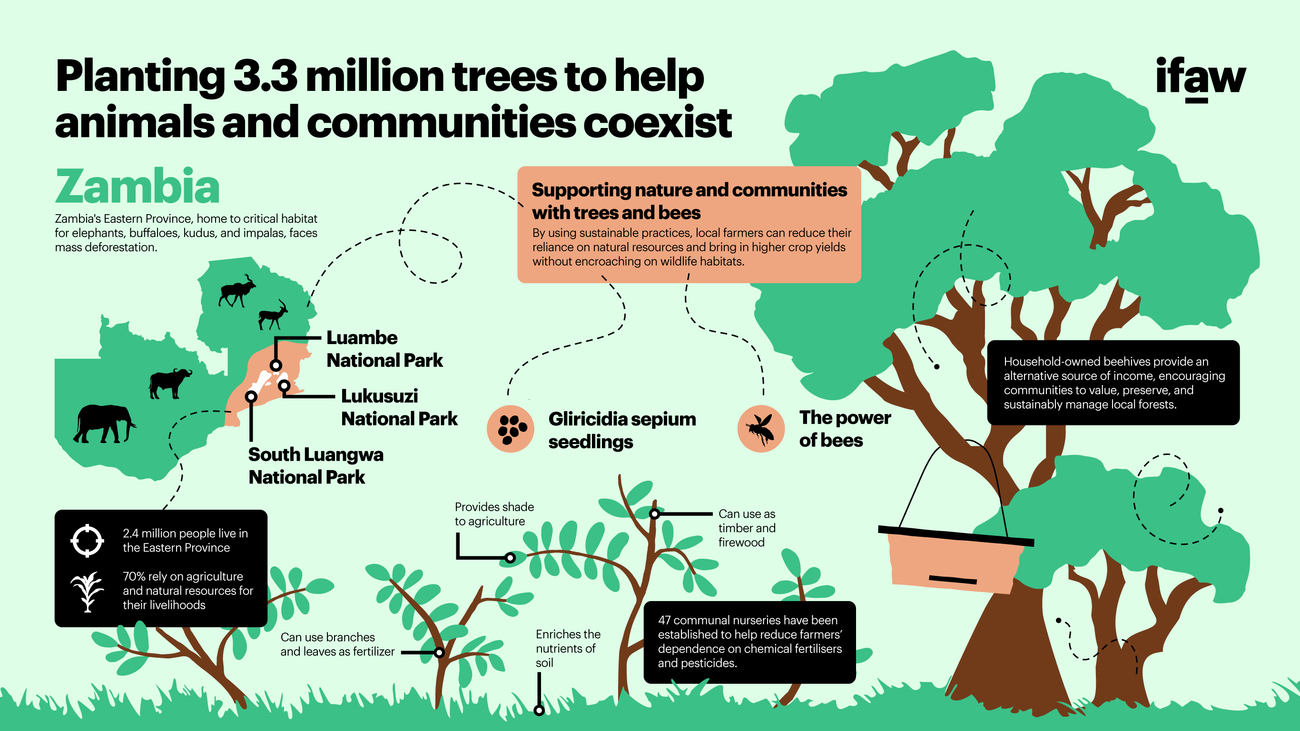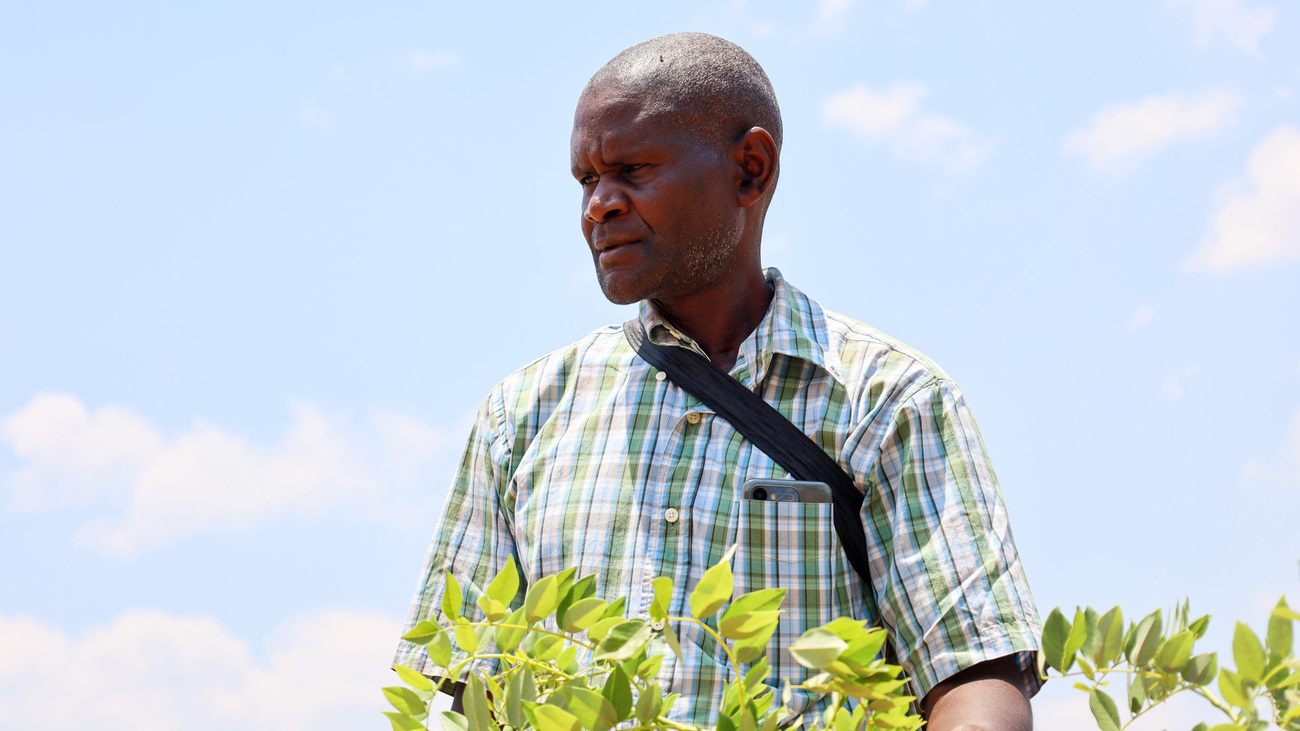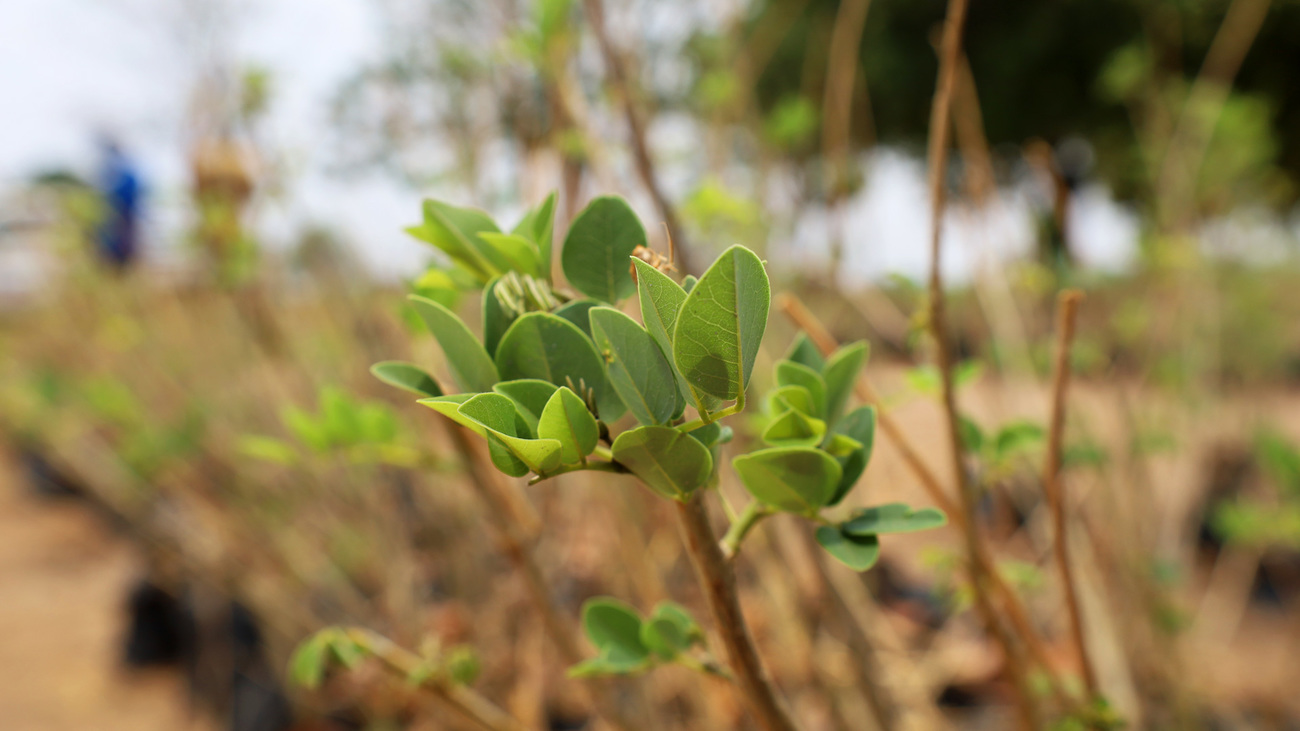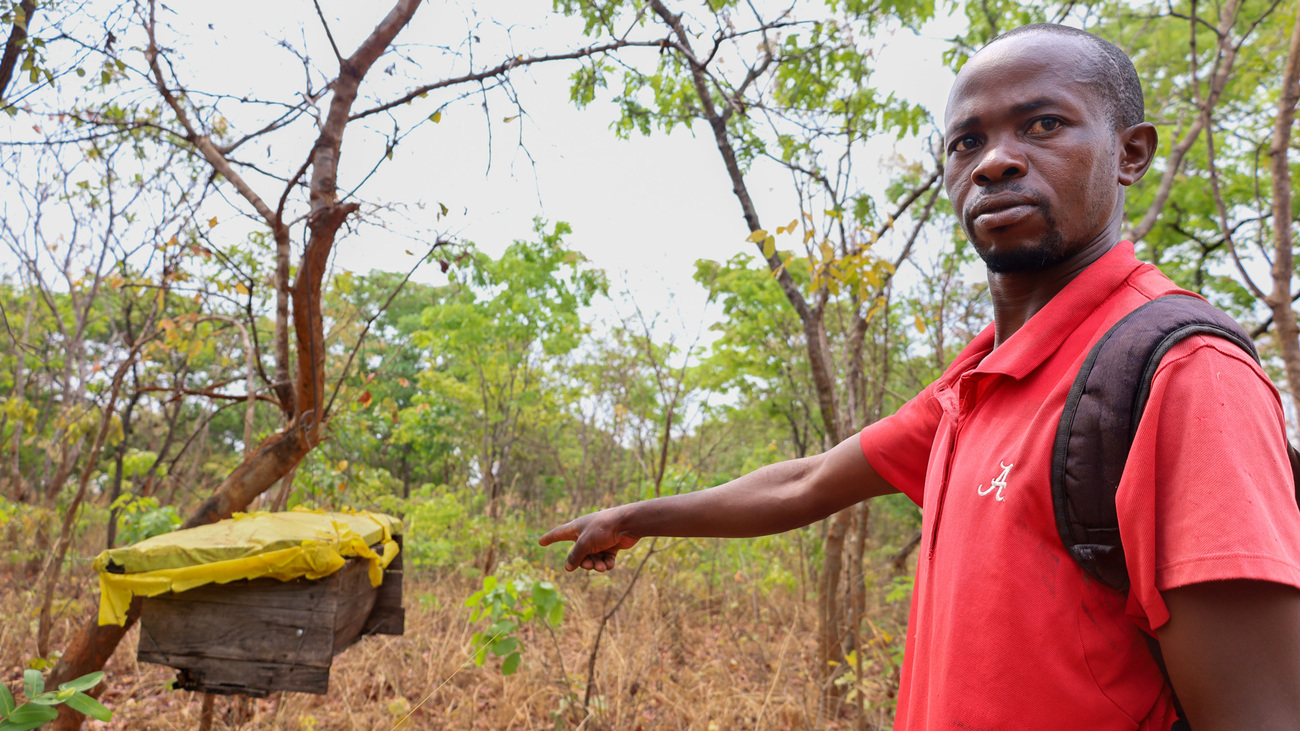Planting 3,300,000 trees to help animals and communities coexist
Planting 3,300,000 trees to help animals and communities coexist
One of Africa’s largest countries, Zambia, is also one of its most forested nations. It is rich with 1,800 wildlife species, including iconic elephants, buffalo, rhinoceroses, and leopards.
The country is fiercely protective of its conservation heritage, with 637 protected areas covering 286,000 square kilometers to preserve wild fauna and flora—including 230 endangered and threatened species.
Yet, Zambia faces mass deforestation, which claims an estimated 79,000 to 150,000 hectares of forest each year. The decline is pronounced in the Eastern Province, where South Luangwa, Luambe, and Lukusuzi national parks play a key role in the Malawi–Zambia Transfrontier Conservation Area (TFCA) and provide vital habitat for wildlife, including migratory species like elephants, which wander freely and cross the border with Malawi.
But there is hope—in the form of trees and bees. With the help of our partners in the region, IFAW has helped local farmers harness the power of a plant that helps restore soil nutrients and brings high yields without the need to expand farmland and encroach further on wildlife habitats. Beekeeping also helps these communities reduce their reliance on the land, instead giving families a more stable, sustainable source of income. It’s a win-win for people and animals.

A scar on the once vibrant landscape
Andrew Mbewe, 67 years old, lives in Siriya village under the jurisdiction of Chief Chikomeni. He's deeply troubled by escalating deforestation in and around the Lukusuzi–Kasungu wildlife corridor.
‘Not so long ago, this area was covered with trees,’ Mbewe reflects. ‘I often think back to my childhood, when I was surrounded by forests and used to see a variety of wildlife such as elephants, buffalos, kudus, and impalas moving freely around this area. It’s heartbreaking to see how much has changed.’
When Mbewe was elected Chairperson of the Chikomeni Community Forest Management Group, one of his first promises was to heal the wounds inflicted by deforestation on his ancestors' land.
Zambia’s 2010 population census showed Eastern Province had a population of 1.6 million; that population has since grown to 2.4 million, with about 70% of people relying on agriculture and natural resources like wood for their livelihoods.
Poor farming practices only make the situation worse, says Mbewe. ‘We need our people to have a change of heart and a change of mind if we are going to save our forests.’
A threat to ecological balance
The ongoing loss of forest cover is already feared to be disrupting elephant movements. Human settlements, farmlands, and modern infrastructure have become a barricade to their migratory routes.

The Kasungu–Lukusuzi wildlife corridor is an essential pathway for elephants migrating between Kasungu National Park in Malawi and Lukusuzi in Zambia, both crucial habitats for elephants. As trees are felled, their natural migration routes are increasingly obstructed and their habitats fragmented. Because elephants are ecosystem engineers, conservationists worry that this will throw off the landscape’s ecological balance.
‘There is an urgent need for conservation efforts to protect these irreplaceable habitats and the wildlife that depends on them,’ says Henry Ndaimani, Landscape Conservation Manager at IFAW.
A collaborative approach to combat forest loss
Solving the problem requires partnership and trust. In Eastern Province, IFAW, Community Markets for Conservation (COMACO), and the Department of National Parks and Wildlife (DNPW) collaborate to promote sustainable farming practices and reduce reliance on natural resources. IFAW and COMACO currently train 3,500 participants in climate-smart agriculture and agroforestry techniques.
Supported by the German Agency for International Cooperation (GIZ), promoting climate-smart agriculture increases productivity on existing arable land by maintaining soil fertility and restoring degraded cropland.
‘We are seeing less destruction of forests to expand croplands depleted by poor farming techniques,’ says Luke Lungu, COMACO Assistant Project Manager. Ultimately, the project’s goal is to improve agricultural livelihoods and provide opportunities for those who may previously have relied on illegal tree cutting, mining, and poaching.
We’ve distributed seedlings of Gliricidia sepium to farmers to help increase soil carbon sequestration on small-scale farm plots. The nitrogen-fixing plant helps restore soil nutrients depleted during plant harvests, promoting sustained high yields without expanding farmland. This helps prevent further habitat loss and fragmentation.

From March 2023 to October 2024, 3,300,000 seedlings of Gliricidia sepium were distributed to 4,714 farmers in the Chikomeni and Mwasemphangwe chiefdoms in Zambia. So far, 47 communal nurseries have been established in these two chiefdoms. Each seedling costs about 20 cents—and each one helps change rural farmers’ lives.
‘Gliricidia helps make farming more environmentally sustainable by reducing farmers’ dependence on chemical fertilizers and pesticides,’ Luke explains. ‘Additionally, the stems of Gliricidia regrow from cut trunks, providing farmers with a renewable source of cooking fuel. This practice alleviates the pressure on natural forests for fuelwood.’
Harnessing the power of bees
Smallholder farmers in the buffer areas of Kasungu and Lukusuzi are also being supported in beekeeping to encourage communities to value, preserve, and sustainably manage forests.

IFAW and our partners aim to establish at least 3,000 household-owned beehives and support farmers with equipment, knowledge, and skills and linked to markets.
‘Beekeeping offers farmers a reliable source of income by selling honey and other valuable products,’ Luke says. ‘This empowers them to break free from reliance on forestry resources like charcoal and timber.’
Restoring forests for improved connectivity
‘With support from our partners and the community, we aim to tackle the root causes of forest loss and degradation while promoting sustainable land management practices,’ says Patricio Ndadzela, IFAW Country Director for Malawi and Zambia. ‘By actively promoting sustainable forest management practices, we aim to protect and preserve the crucial habitats that support migratory species such as elephants.’
IFAW's Room to Room initiative focuses on creating secure routes for elephants to move freely between habitats. This initiative, backed by 25 years of science, aims to enhance connectivity across critical landscapes for elephant populations.
Learn more about Room to Roam >>
Related content
Our work can’t get done without you. Please give what you can to help animals thrive.